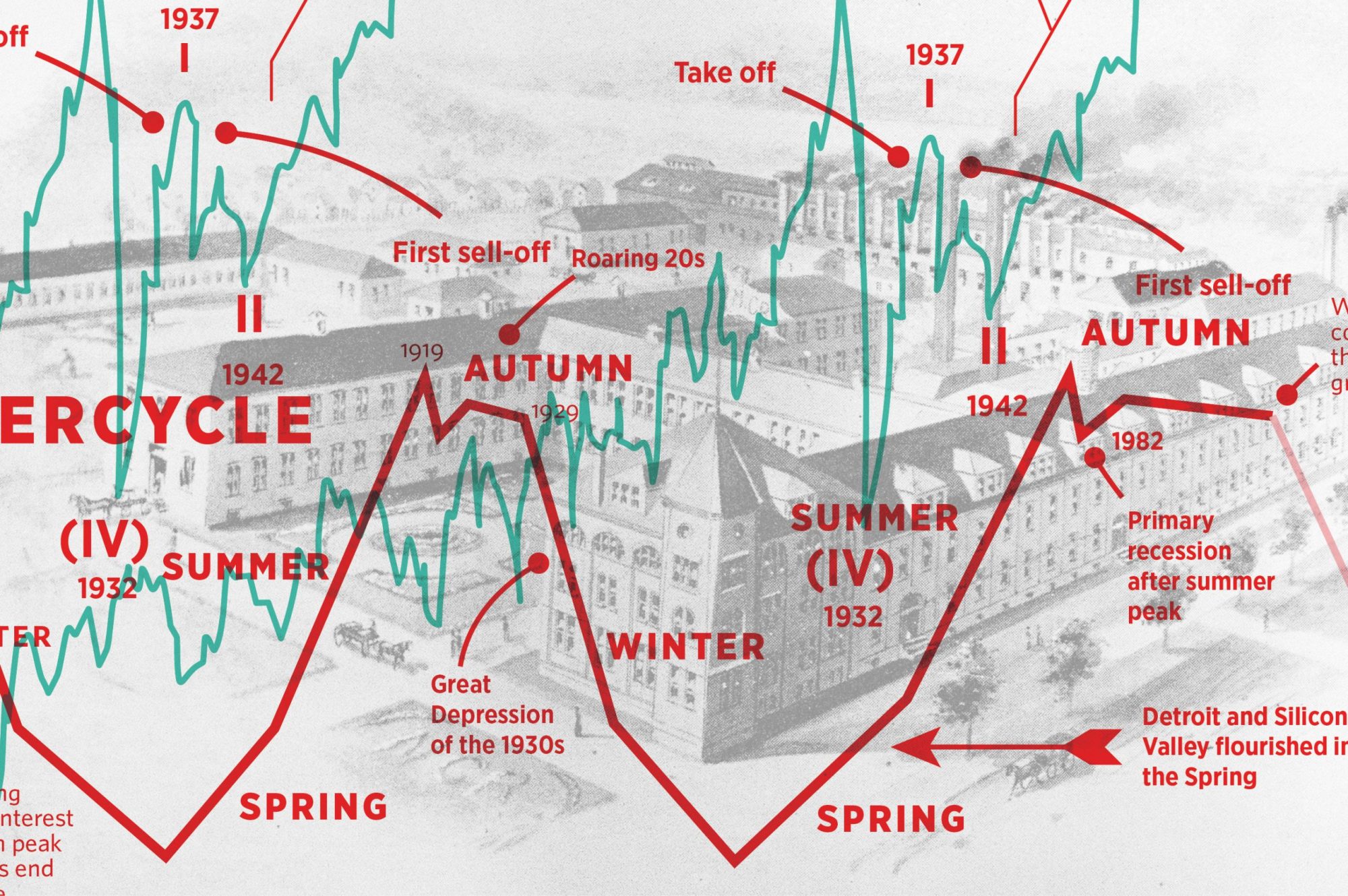
What Can System Thinkers Learn from Quantifying History

Hosted by
Systems Thinking Ontario
Wednesday, September 10th 2025
6:30PM to 8:20PM EDT
In-Person
Address available to attendees
We missed you this time around!
“Unprecedented” is a term that gets thrown around a lot these days amidst pandemic, war, ecological disasters, and other upheavals. But is what we’re collectively experiencing truly “unprecedented”? Researchers working in quantitative history shed light on this by examining past civilizations and cycles to find common patterns, which can help us understand the present.
In this session, we’ll discuss the relationship between systems thinking and quantitative history with Daniel Hoyer and Neal Halverson, moderated by Zaid Khan. We’ll explore similarities and differences between these two perspectives and how they can complement our understanding of complexity at the civilizational (and multi-civilizational) level.
Discussants
- Daniel Hoyer is a computational historian and complexity scientist. He holds a PhD in Classics from New York University, where he studied economic and social development in the high Roman Empire. Since 2014 he has been a part of Seshat: Global History Databank, a multidisciplinary project examining long-run social dynamics by combining qualitative and empirical information about the past with advanced quantitative analysis and computational modeling. He has affiliations with the Complexity Science Hub, Vienna and the SocialAI lab at the University of Toronto, and is the founder of a new organization: SoDy, the historical policy lab. His research explores societal responses to shifting ecological, social, and economic contexts that generate crises and shape the well-being experienced by different communities, looking into examples from the past as well as how this understanding may shed light on critical social pressures today. https://so-dy.org/
- Neal Halverson is a multi-dimensional designer and graduate of OCADU’s Strategic Foresight and Innovation program (2019). Neal has practiced design at both creative agencies and in-house design teams. Neal uses Design Thinking and innovation frameworks such as journey mapping to help bring clients into a better service practice in technology. For his masters research project, Neal attempted to show how history can be used to prepare for a better future when combined with theory and emerging foresight practices. To do this, Neal used a mixed set of cyclical historical framing methods - Kondratieff, Schumpeter, Elliot waves and the Fourth Turning - to map the rise and fall of innovation ecosystems in key locations in the United States. https://nealhalverson.com/
- Zaid Khan is a strategist and graduate of OCADU’s Strategist Foresight and Innovation Program (2020). Zaid is an enthusiast of grand civilizational strategy and historical thinking.
Timing, Venue, and Registration
- Wednesday, September 10, 6:30 pm - 8:15 pm (option to continue conversation at a restaurant nearby)
- OCADU Graduate Studies, 205 Richmond Street West, Room 511 (not 510, unless you're looking for the Future Cinemas class)
Suggested pre-readings / audio / video
- Hoyer, Daniel (2025). Is Canada heading down a path that has caused the collapse of mighty civilizations in the past? The Conversation Canada. Available at https://theconversation.com/is-canada-heading-down-a-path-that-has-caused-the-collapse-of-mighty-civilizations-in-the-past-254378
- Hoyer, Daniel (2024). History’s crisis detectives: how we’re using maths and data to reveal why societies collapse – and clues about the future. The Conversation Canada. Available at https://theconversation.com/historys-crisis-detectives-how-were-using-maths-and-data-to-reveal-why-societies-collapse-and-clues-about-the-future-218969
- Halverson, Neal (2019). Foresight Playback: Mapping the Future of Industrial Regions by Learning from Historical Cycles of Innovation. [MRP] https://openresearch.ocadu.ca/id/eprint/2548/
- Halverson, Neal (2019). Carving out a new destiny: Dayton’s bid to lift itself up. Medium. Available at https://medium.com/@halverson.neal/carving-out-a-new-destiny-daytons-bid-to-lift-itself-up-f4cdeaf5d304
- How Elite Surplus and Inequality Lead to Societal Upheaval with Peter Turchin (2025) | The Great Simplification EP#164. Available at https://www.youtube.com/watch?v=bk9bs0F_oIU
Image: 19th-century Dayton meets cycles of innovation and finance (Neal Halverson, 2019)
More info: https://wiki.st-on.org/2025-09-10
Platform Sponsors

Don't let broken lines of code, busted API calls, and crashes ruin your app. Join the 4M developers and 90K organizations who consider Sentry “not bad” when it comes to application monitoring. Use code “guild” for 3 free months of the team plan.
https://sentry.io

Torc is a community-first platform bringing together remote-first software engineer and developer opportunities from across the globe. Join a network that’s all about connection, collaboration, and finding your next big move — together.
Join our community today!

We missed you this time around!
Platform Sponsors

Don't let broken lines of code, busted API calls, and crashes ruin your app. Join the 4M developers and 90K organizations who consider Sentry “not bad” when it comes to application monitoring. Use code “guild” for 3 free months of the team plan.
https://sentry.io

Torc is a community-first platform bringing together remote-first software engineer and developer opportunities from across the globe. Join a network that’s all about connection, collaboration, and finding your next big move — together.
Join our community today!
What Can System Thinkers Learn from Quantifying History

Hosted by
Systems Thinking Ontario
Sep
10
Wednesday, September 10th 2025
6:30PM to 8:20PM EDT
In-Person
Address available to attendees
“Unprecedented” is a term that gets thrown around a lot these days amidst pandemic, war, ecological disasters, and other upheavals. But is what we’re collectively experiencing truly “unprecedented”? Researchers working in quantitative history shed light on this by examining past civilizations and cycles to find common patterns, which can help us understand the present.
In this session, we’ll discuss the relationship between systems thinking and quantitative history with Daniel Hoyer and Neal Halverson, moderated by Zaid Khan. We’ll explore similarities and differences between these two perspectives and how they can complement our understanding of complexity at the civilizational (and multi-civilizational) level.
Discussants
- Daniel Hoyer is a computational historian and complexity scientist. He holds a PhD in Classics from New York University, where he studied economic and social development in the high Roman Empire. Since 2014 he has been a part of Seshat: Global History Databank, a multidisciplinary project examining long-run social dynamics by combining qualitative and empirical information about the past with advanced quantitative analysis and computational modeling. He has affiliations with the Complexity Science Hub, Vienna and the SocialAI lab at the University of Toronto, and is the founder of a new organization: SoDy, the historical policy lab. His research explores societal responses to shifting ecological, social, and economic contexts that generate crises and shape the well-being experienced by different communities, looking into examples from the past as well as how this understanding may shed light on critical social pressures today. https://so-dy.org/
- Neal Halverson is a multi-dimensional designer and graduate of OCADU’s Strategic Foresight and Innovation program (2019). Neal has practiced design at both creative agencies and in-house design teams. Neal uses Design Thinking and innovation frameworks such as journey mapping to help bring clients into a better service practice in technology. For his masters research project, Neal attempted to show how history can be used to prepare for a better future when combined with theory and emerging foresight practices. To do this, Neal used a mixed set of cyclical historical framing methods - Kondratieff, Schumpeter, Elliot waves and the Fourth Turning - to map the rise and fall of innovation ecosystems in key locations in the United States. https://nealhalverson.com/
- Zaid Khan is a strategist and graduate of OCADU’s Strategist Foresight and Innovation Program (2020). Zaid is an enthusiast of grand civilizational strategy and historical thinking.
Timing, Venue, and Registration
- Wednesday, September 10, 6:30 pm - 8:15 pm (option to continue conversation at a restaurant nearby)
- OCADU Graduate Studies, 205 Richmond Street West, Room 511 (not 510, unless you're looking for the Future Cinemas class)
Suggested pre-readings / audio / video
- Hoyer, Daniel (2025). Is Canada heading down a path that has caused the collapse of mighty civilizations in the past? The Conversation Canada. Available at https://theconversation.com/is-canada-heading-down-a-path-that-has-caused-the-collapse-of-mighty-civilizations-in-the-past-254378
- Hoyer, Daniel (2024). History’s crisis detectives: how we’re using maths and data to reveal why societies collapse – and clues about the future. The Conversation Canada. Available at https://theconversation.com/historys-crisis-detectives-how-were-using-maths-and-data-to-reveal-why-societies-collapse-and-clues-about-the-future-218969
- Halverson, Neal (2019). Foresight Playback: Mapping the Future of Industrial Regions by Learning from Historical Cycles of Innovation. [MRP] https://openresearch.ocadu.ca/id/eprint/2548/
- Halverson, Neal (2019). Carving out a new destiny: Dayton’s bid to lift itself up. Medium. Available at https://medium.com/@halverson.neal/carving-out-a-new-destiny-daytons-bid-to-lift-itself-up-f4cdeaf5d304
- How Elite Surplus and Inequality Lead to Societal Upheaval with Peter Turchin (2025) | The Great Simplification EP#164. Available at https://www.youtube.com/watch?v=bk9bs0F_oIU
Image: 19th-century Dayton meets cycles of innovation and finance (Neal Halverson, 2019)
More info: https://wiki.st-on.org/2025-09-10
Get in touch!
hi@guild.host